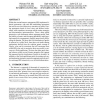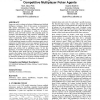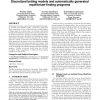28 search results - page 4 / 6 » A technique for reducing normal-form games to compute a Nash... |
SIGECOM
2006
ACM
14 years 1 months ago
2006
ACM
Finding an equilibrium of an extensive form game of imperfect information is a fundamental problem in computational game theory, but current techniques do not scale to large games...
SIGECOM
2010
ACM
14 years 5 days ago
2010
ACM
This paper studies —from the perspective of efficient computation— a type of competition that is widespread throughout the plant and animal kingdoms, higher education, politic...
CONEXT
2007
ACM
13 years 11 months ago
2007
ACM
Within the current Internet, autonomous ISPs implement bilateral agreements, with each ISP establishing agreements that suit its own local objective to maximize its profit. Peerin...
ATAL
2010
Springer
13 years 8 months ago
2010
Springer
Games are used to evaluate and advance Multiagent and Artificial Intelligence techniques. Most of these games are deterministic with perfect information (e.g. Chess and Checkers)....
ATAL
2008
Springer
13 years 9 months ago
2008
Springer
We present Tartanian, a game theory-based player for headsup no-limit Texas Hold'em poker. Tartanian is built from three components. First, to deal with the virtually infinit...



